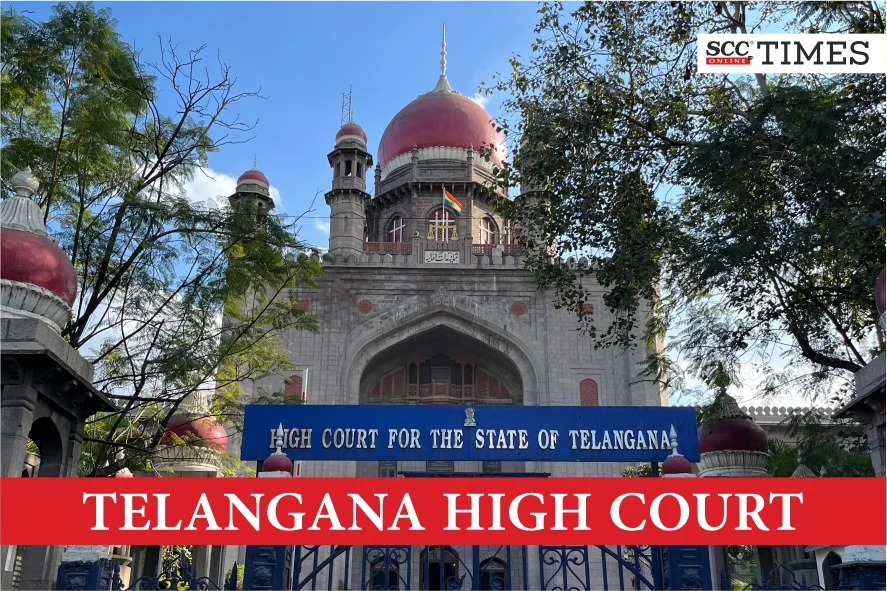Telangana High Court: A petition was filed under Article 226 of the Constitution raising a question that whether petitioner which was registered under Sales Tax and GST regime in Maharashtra, but could not file its return in the GST portal of that State because of technical glitch and filed it in the GST portal of Telangana, could be saddled with demand, penalty, and interest despite the fact that petitioner’s branch existed in the State of Telangana, especially when credit taken by petitioner was transferred to Maharashtra portal on the same day. Thus, in the present case, the question was about the scope and ambit of Section 140 of the Central Goods and Services Tax Act, 2017 (‘the CGST Act’).
The Division Bench of Sujoy Paul* and Namavarapu Rajeshwar Rao, JJ., opined that it was the duty of the Department to keep their portal functional and if the portal was not functional or was having technical glitch and because of that, petitioner was compelled to file return in the portal of Telangana, then petitioner could not be saddled with demand, interest, and penalty.
Background
Petitioner’s headquarter was in Mumbai, Maharashtra and the centralized registration of petitioner was also at Maharashtra under the Service Tax and the CGST Act. Petitioner was entitled to enjoy the credit of Rs 1,41,26,69,646 and it made efforts to file the Return on the official GST portal of Maharashtra, but because of technical glitch in the Maharashtra portal, his efforts went in vain. Petitioner had a branch in Telangana and accordingly, he filed the Returns in the portal of Telangana, took credit, and transferred it on the same day to the portal of Maharashtra.
Petitioner was served with a pre-show cause notice, wherein it was alleged that the credit availed by petitioner through TRAN-I return filed by the Telangana registration was ineligible and required to be reversed along with applicable interest and penalty. Petitioner made it clear that total transitional credit of Rs 1,41,26,69,646 was transferred to Maharashtra GST registration on the same day of filing the TRAN-1 and only the differential balance of ITC amounting Rs 2,00,000 was available in the State of Telangana. Thereafter, respondents issued a show-cause notice and petitioner filed his reply to it, but respondents were not satisfied with the reply and thus passed the impugned Order-in-Original dated 31-10-2023, which was challenged in the present petition.
Analysis, Law, and Decision
The issue for consideration was “whether in the teeth of Section 140 of the CGST Act, was there any bar or prohibition for filing return in the GST portal of Telangana where petitioner’s branch existed?”.
The Court took note of the impugned order and stated that it was admitted in the show cause notice itself that petitioner faced problem in filing return electronically because of technical glitch in the GST portal of Maharashtra. Thus, for this reason and considering the last date of filing return, petitioner filed the return in the Telangana GST portal.
The Court observed that as per Section 140(1) of the CGST Act, a registered person other than a person opting to pay taxes under Section 10 shall be entitled to take, in his electronic credit ledger, the amount of CENVAT credit. The Court stated that the registration number/Permanent Account Number (‘PAN’) of petitioner was same nationwide and thus, Section 140(1) did not permit respondents to arrive at a conclusion that petitioner was obliged to file return electronically only in the GST portal of Maharashtra.
The Court opined that the Revenue could not establish that there existed any prohibition/bar in filing the return through electronic mode in GST portal of Telangana where petitioner’s branch existed. Further, it was also not established that petitioner derived any undue benefit by filing a return in the GST portal of Telangana and transferring the credit on the same day and the Revenue suffered any loss because of petitioner’s action.
The Court opined that it was the duty of the Department to keep their portal functional and if the portal was not functional or was having technical glitch and because of that petitioner was compelled to file return in the portal of Telangana, then petitioner could not be saddled with demand, interest, and penalty. The Court relied on Devendra Kumar v. State of Uttaranchal, (2013) 9 SCC 363 and opined that the Department could not take benefit of its own wrong.
The Court thus held that the foundation of show cause notice itself was bad in law and the assumption that return could not have been filed in the GST portal of Telangana did not flow from Section 140 of the CGST Act. Therefore, the Court stated that the impugned action founded upon such notion was bad in law and deserved interference. The Court allowed the writ petition by setting aside the show cause notice and Order-in-Original.
[Standard Chartered Bank v. Commr. (GST), 2024 SCC OnLine TS 1650, decided on 11-07-2024]
*Judgment authored by: Justice Sujoy Paul
Advocates who appeared in this case :
For the Petitioner: Lakshmi Kumaran Sridharan, Counsel
For the Respondents: B. Narayan Reddy, Senior Counsel representing Uday Kumar Bhagwath







